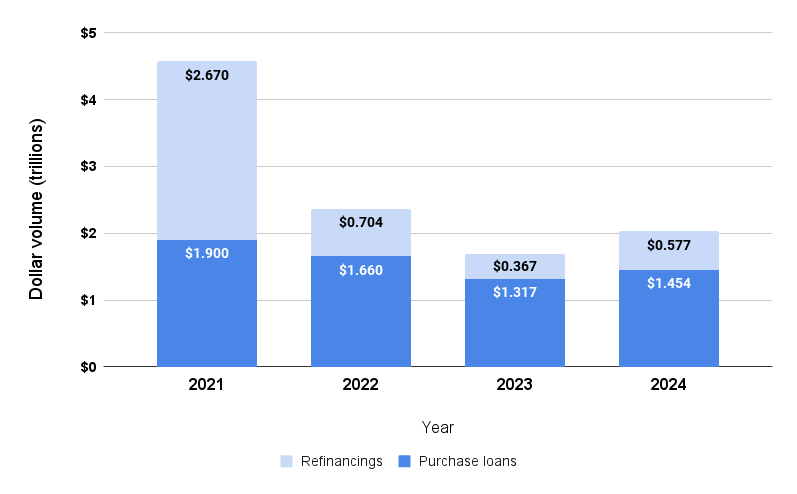Companies said that instead of laying off workers, they’re trimming their payrolls through attrition or by offering voluntary buyouts.
In these times, double down — on your skills, on your knowledge, on you. Join us Aug. 8-10 at Inman Connect Las Vegas to lean into the shift and learn from the best. Get your ticket now for the best price.
They’re not calling them layoffs, but the 2022 annual reports filed by two of the nation’s leading mortgage lenders — Rocket and United Wholesale Mortgage — show the companies cut nearly 10,000 workers from their combined payrolls last year in a race to cut costs and curtail losses as rising mortgage rates stunted lending.
In its annual report to investors, Rocket Companies Inc. — the parent company of a stable of brands, including Rocket Mortgage, Rocket Homes and Amrock — disclosed that it shed 7,500 workers in 2022, finishing the year with 18,500 employees or 29 percent fewer than it began with.
United Wholesale Mortgage’s parent company, UWM Holdings Corp., disclosed that it finished the year with 6,000 employees, shedding 2,000 workers or 25 percent of the 8,000 employees it started the year with.
The companies say that instead of laying off workers, they’re trimming their payrolls through attrition — not filling roles left vacant when workers retire or leave for jobs with other companies — or by offering voluntary buyouts.
[embedded content]
“We’ve never had a layoff in 37 years of business, never will — we don’t think it’s the right thing to do to our people,” UWM CEO Mat Ishbia told CNBC’s Squawk Box Thursday.
UWM reported a $62.5 million fourth-quarter net loss Wednesday but retained its position as America’s biggest provider of home loans. On Squawk Box, Ishbia blamed UWM’s fourth-quarter loss on a $150.8 million writedown in the value of UWM’s mortgage servicing rights.
Noting that UWM booked nearly $1 billion in profits for the full year ($931.9 million), Ishbia insisted that “we’re operating profitably — last quarter, and every quarter since I’ve been running the company.”
A UWM spokesperson said via email that, “Based on market conditions, we no longer need to hire aggressively to grow our business and support our clients. Through natural attrition, for various reasons — relocation, a family commitment, new opportunity, etc. — our team member count has balanced out. It’s important to note that our hiring classes now include 50-100 new team members, where before it was 400-500.”
Rocket, which reported a $493 million fourth-quarter net loss Tuesday, slashed 2022 annual expenses by 25 percent to $5.1 billion to salvage a $700 million profit for the full year.
Asked for more details on which areas of the company have seen the deepest job cuts and whether employees left voluntarily or were laid off, Rocket said in a statement that it “offered select team members the option to participate in a voluntary career transition program. Those who chose this option received significant cash incentives, extended healthcare and more. Additionally, the company selectively backfilled critical positions as team members exited the company to better align headcount with market demand.”
“Last year was challenging for the housing and mortgage industry, and one defined by rapid change,” Rocket’s statement reads. “Having experienced many market cycles in our 37-year history, we recognized this tough market would limit career growth options in certain areas of the business.”
Last year’s abrupt run-up in mortgage rates curtailed the highly profitable business of refinancing loans and undermined homebuying power. A number of lenders and companies that provide services to them have laid off workers, including Better, loanDepot, Mr. Cooper and Wells Fargo.
Purchase loan volume expected to bottom this year

Source: Fannie Mae Housing Forecast, February 2023
In a February forecast, Fannie Mae economists said they expect the U.S. will fall into a “modest recession” during the second quarter of 2023, and that a recent resurgence in mortgage rates will also dent purchase loan originations. Fannie Mae projects purchase mortgage originations will fall 20.7 percent this year to $1.32 trillion, before rebounding by 10.4 percent in 2024 to $1.45 trillion.
Get Inman’s Extra Credit Newsletter delivered right to your inbox. A weekly roundup of all the biggest news in the world of mortgages and closings delivered every Wednesday. Click here to subscribe.
- SEO Powered Content & PR Distribution. Get Amplified Today.
- Platoblockchain. Web3 Metaverse Intelligence. Knowledge Amplified. Access Here.
- Source: https://www.inman.com/2023/03/03/leading-lenders-rocket-and-uwm-cut-nearly-10000-positions-in-2022/
- $1 billion
- 000
- 1
- 10
- 2022
- 2023
- 2024
- 7
- 9
- a
- Additionally
- All
- and
- annual
- areas
- attrition
- Aug
- before
- BEST
- Better
- Biggest
- Billion
- Bottom
- brands
- business
- Buyouts
- calling
- Career
- Cash
- ceo
- certain
- challenging
- change
- chose
- classes
- clients
- COM
- combined
- commitment
- Companies
- company
- conditions
- Connect
- content
- Corp
- Costs
- credit
- critical
- Cut
- cut costs
- cuts
- cycles
- deepest
- defined
- delivered
- Demand
- details
- Dont
- double
- down
- during
- economists
- embedded
- employees
- etc
- Every
- expect
- expected
- expenses
- experienced
- Fall
- family
- February
- Forecast
- from
- full
- Grow
- Growth
- healthcare
- here
- highly
- hire
- Hiring
- history
- Holdings
- Home
- Homes
- housing
- HTTPS
- important
- in
- Inc.
- Incentives
- include
- Including
- industry
- instead
- Investors
- IT
- Job
- job cuts
- Jobs
- join
- Join us
- knowledge
- LAS
- Las Vegas
- Last
- Last Year
- LAYOFF
- layoffs
- leading
- LEARN
- Leave
- lenders
- lending
- LIMIT
- loan
- Loans
- longer
- loss
- losses
- many
- Market
- market conditions
- max-width
- member
- Members
- million
- more
- Mortgage
- Mortgages
- Nations
- Natural
- nearly
- Need
- net
- New
- news
- number
- offering
- ONE
- operating
- Opportunity
- Option
- Options
- originations
- Other
- parent company
- participate
- Payrolls
- People
- percent
- plato
- Plato Data Intelligence
- PlatoData
- player
- position
- positions
- power
- Profit
- profitable
- profits
- Program
- projects
- provide
- provide services
- provider
- purchase
- Quarter
- Race
- rapid
- Rates
- reasons
- received
- recent
- recognized
- Reported
- Reports
- rights
- rising
- rocket
- roles
- roundup
- running
- Said
- SEC
- Second
- second quarter
- Services
- shift
- show
- significant
- since
- skills
- spokesperson
- stable
- Statement
- subscribe
- support
- team
- The
- the world
- their
- thing
- Think
- this year
- Through
- ticket
- times
- to
- transition
- Trillion
- Tuesday
- u.s.
- United
- us
- value
- various
- VEGAS
- via
- Video
- volume
- voluntarily
- Wednesday
- weekly
- Wells
- Wells Fargo
- whether
- which
- WHO
- wholesale
- will
- workers
- world
- would
- year
- years
- Your
- youtube
- zephyrnet












